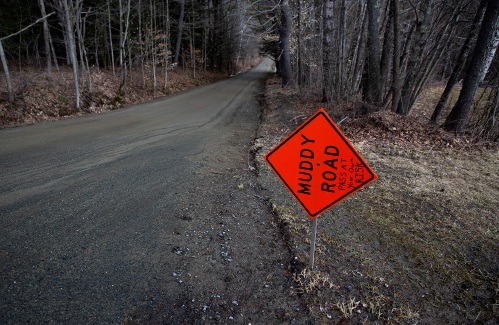Towns in the Upper Valley are grappling with the financial fallout of an extreme mud season that struck in the midst of soaring highway material costs.
“If this becomes common, towns will have to budget,” said Kevin Geiger, director of planning at the Two Rivers-Ottauquechee Regional Commission — a possibility as some climate scientists hypothesize that mud seasons may become more severe as New England warms.
Meanwhile, construction expenses have skyrocketed; the cost of a culvert has doubled since last year, and a bridge that used to run $200,000 now costs more in the range of half a million, he said.
The state decided against classifying this year’s unusually bad spring melt as a mud disaster, so towns have had to find the money to repair the damage themselves.
That left the Strafford with few options, and now its Selectboard plans to use federal dollars from the American Rescue Plan Act, better known as ARPA, to pay for much-needed road repairs.
“There are other things we’d like to do, but everyone needs this,” said Mary Linehan, a member of the Selectboard. The town was allocated about $318,000 in ARPA funds, and the current estimate of the necessary road repairs is about $200,000 more than the $797,679 budgeted for all of 2022. Strafford has also already used up all of its highway crew’s allocated overtime for the year and tapped into last year’s surplus highway funding to purchase gravel on short notice.
The problem also isn’t over: More rain fell this week, and some roads have yet to solidify.
But the degree of damage isn’t entirely Mother Nature’s fault, according to Linehan. Mud season could have been less severe if Strafford had done a better job maintaining its roads, she argued, citing culverts that are either too small or too old and roads so low that a flood of mud inundates them year after year.
“We came to terms with something we never paid attention to before: 75% of non-seasonal residents are on gravel roads,” Linehan said. “We had disproportionately ignored gravel roads and focused on the paved center of town.”
Recent updates to the rules governing how towns can spend ARPA money loosen spending restrictions, which at first limited spending on sewer, water and broadband. Small towns like Strafford that can show lost revenue during the pandemic are allowed to allocate spending to projects that would fall under typical municipal spending, rather than finding a project that meets extensive guidelines from the federal government.
The Vermont League of Cities and Towns has advised towns to take this option.
ARPA funds are a timely windfall, and the Selectboard is looking ahead at how to sustain better-maintained roads in the future. Strafford will need to invest in an “enormous amount of work over the next five to 10 years,” Linehan said.
“Our budgets are simply going to have to reflect the real costs,” she said.
The town has about 60 miles of dirt roads, and only about 12 miles are Class 4 roads the town is not required to maintain. After a level-funded budget for several years, Strafford will have to acknowledge that highway budgets will have to be “significantly higher,” she said. Just how much of an increase remains uncertain, although bond payments on the town garage end next year, which she said will help.
What is clear is that repairs are badly needed, and highway materials are up as much as 40% with no end in sight.
Other projects that residents had hoped may be funded with ARPA money included adding bike lanes, renovating the town garage to be more energy-efficient and equipping Barrett Hall to be a cooling center for the elderly in case of a heat wave.
“Those are all things we’d love to have … and they’re not off the table. We’re just not sure what proportion of the money (will be available),” Linehan said.
Rita Seto, who works on transportation issues at TRORC, said that Strafford is the only town that has committed to using its ARPA funds for road repairs so far, but many towns are considering it as an option as they grapple with depleted gravel budgets and much-needed repairs.
“Right now, with everything going on with construction season, the supply chain, the labor shortage, the infrastructure bill coming down the line — a lot of towns are struggling to make sense of it all,” she said.
Meanwhile, some towns are draining reserve funds or putting off repairs after mud season raided their budgets.
Barnard has over 90 miles of dirt road, although nearly half are Class 4. The town spent $88,875 in extraordinary costs that will entirely deplete an approximately $60,000 emergency highway fund, said zoning administrator Rob Ramrath. He explained that the account will enter a deficit, but it will be manageable because of the town’s surplus and “thoughtful management of other accounts throughout the fiscal year.” Any additional needed mud expenses will be drawn from the town’s regular accounts, including one for materials.
At the next Town Meeting, residents will vote on an article to replenish the emergency fund, Ramrath said.
At a Selectboard meeting in early April, residents raised concerns about road conditions in Barnard, arguing that the town ought to have done more. The road crew explained that repairs are difficult when accessing a damaged road involves trekking through mud that can damage equipment.
Canaan saw extra road costs in the range of $20,000 to $30,000, Town Administrator Mike Samson said. The town will put off some planned road repairs this summer.
Thetford may also postpone some patching on asphalt roads, said town manager Bryan Gazda. In the meantime, two retired scientists from the Hanover-based Cold Regions Research and Engineering Laboratory are advising the town on how to better maintain its road s going forward.
Claire Potter is a Report for America corps member. She can be reached at [email protected] or 603-727-3242.


